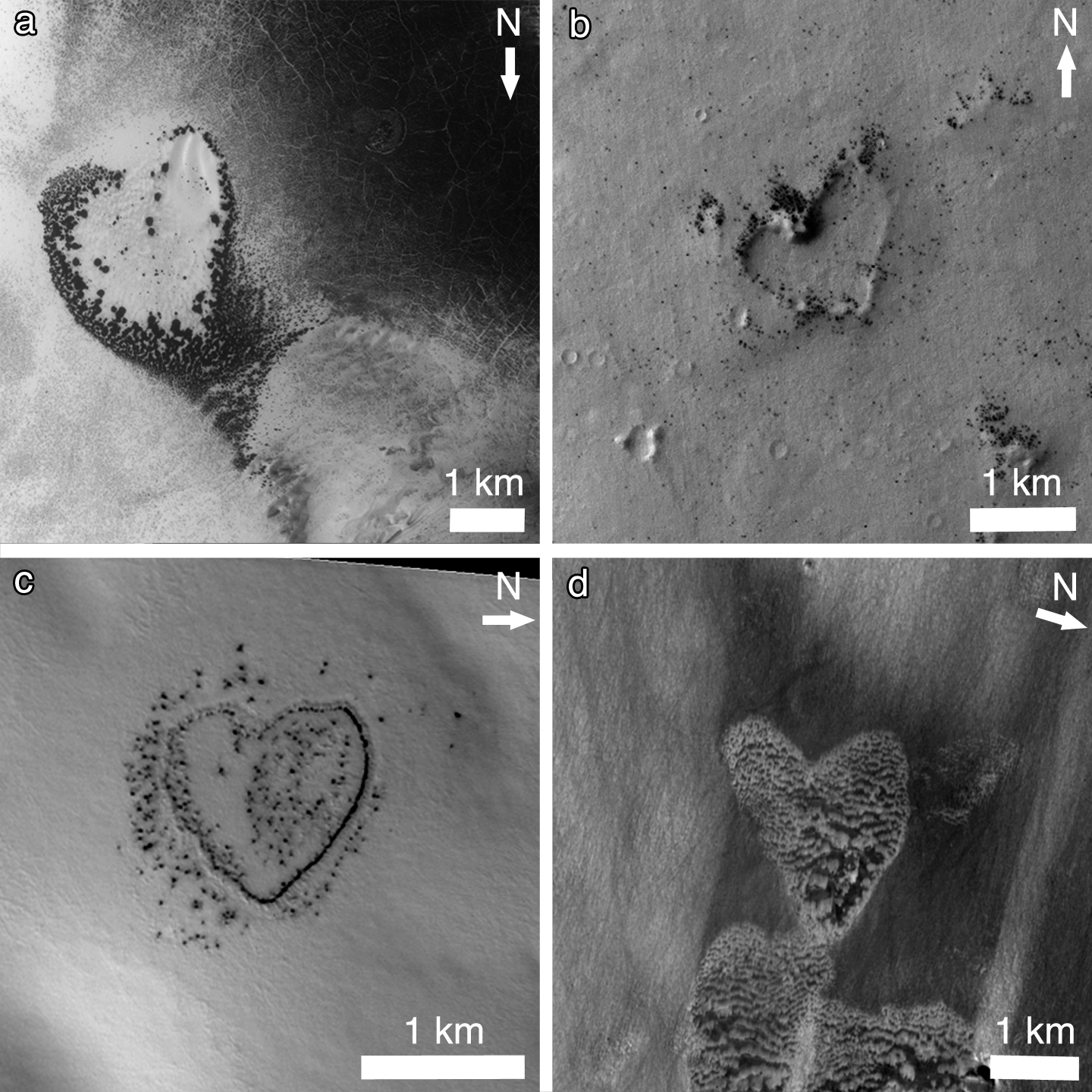Mars Valentine 2021
Captioned Image Release No. MSSS-595 — 14 February 2021
NASA/JPL-Caltech/Malin Space Science Systems
|
|||||
Mars Valentine 2021Happy St. Valentine’s Day from the Mars Reconnaissance Orbiter (MRO) Context Camera (CTX)! This year we are celebrating with heart-shaped features in CTX images from the southern high-latitude regions of Mars.
Subframe (a) was taken by the CTX camera onboard the MRO spacecraft on August 11, 2020, during southern Martian spring. The heart-shaped feature defined by the seasonal dark albedo spots is approximately 2.5 kilometers wide and is centered at 74.3°S, 355.7°W.
The heart-shaped depression in subframe (b) is from the same CTX image taken on August 11, 2020 as (a). It is approximately 1.5 kilometers wide and is centered at 76.3°S, 355.2°W.
The positive-relief heart-shaped feature in subframe (c) was taken by the CTX camera on August 13, 2020. This feature is approximately 1.3 kilometers wide and is centered at 78.4°S, 341.7°W.
The heart-shaped feature formed by the light- and dark-toned material in subframe (d) was taken by CTX on October 25, 2020, during southern Martian summer. This feature is approximately 2 kilometers wide and is centered at 77.6°S, 243.9°W.
Over the past 22 years, Malin Space Science Systems has featured other heart-shaped martian landforms on Valentine's Day in images acquired by MRO CTX and the Mars Global Surveyor (MGS) Mars Orbiter Camera (MOC). These previous examples can be viewed by clicking on the following links:
|
|||||
|
To cite the image(s) and caption information in a paper or report: Malin, M. C., M. R. Wu, G. T. Speth, A. Werynski, D. A. Susko, and L. Posiolova (2021), Mars Valentine 2021, Malin Space Science Systems Captioned Image Release, MSSS-595, http://www.msss.com/science-images/mars-valentine-2021.php. The image(s) and caption are value-added products. MSSS personnel processed the images and wrote the caption information. While the images are in the Public Domain, NASA/JPL-Caltech/MSSS requests that you credit the source of the image(s). Please give the proper credit for use of the image(s) and/or caption. |
|
Malin Space Science Systems (MSSS) built and operates the Mars Science Laboratory (MSL) Curiosity rover Mast Camera (Mastcam) and Mars Hand Lens Imager (MAHLI) and Mars Descent Imager (MARDI), the Mars Reconnaissance Orbiter (MRO) Mars Color Imager (MARCI) and Context Camera (CTX), and the Jupiter Orbiter (JUNO) camera (Junocam). MSSS also built and operated the Mars Global Surveyor (MGS) Mars Orbiter Camera (MOC). In addition, MSSS built the Mars Odyssey (ODY) Thermal Emission Imaging Spectrometer (THEMIS) Visible (VIS) camera subsystem, which shares optics with the thermal infrared instrument and is operated at Arizona State University (ASU). MSSS also built the Mars Descent Imager (MARDI) for the Phoenix Mars Scout lander, the suite of high resolution cameras aboard the 2009 Lunar Reconnaissance Orbiter (LRO), and Origins-Spectral Interpretation-Resource Identification-Security-Regolith Explorer (OSIRIS-REX) mission. MSSS is currently working on cameras for the Mars 2020 rover mission. |




